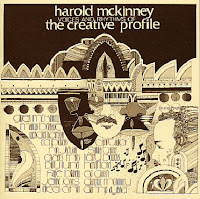



Detroit, Michigan. Motor City. The 313. Fewer than one million inhabitants but perhaps the richest and most influential musical heritage of any city of that size; a heritage of which sadly many of even its inhabitants are unaware. The home of Stevie, of Arethra, of Motown. The home of techno, from the first wave originators Juan Atkins, Kevin Saunderson and Derrick May to the all-conquering Carl Craig. The home, more recently, to distinctive new hip hop and soul from Slum Village, from Dwele, the Platinum Pied Pipers, Amp Fiddler and the late J Dilla. The home of Moodymann. A city always innovating and always creating, defying definitions. Eminem and the White Stripes also call it theirs.
It’s not surprising that Detroit was home to Tribe Records, set up in 1972 by Wendell Harrison, an established jazzman then teaching at Detroit’s Metro Arts Complex, and Phil Ranelin, a session trombonist with people like Stevie Wonder. A label important on the one hand because of the excellence of the music it released, and on the other because of the progressive, collective, political and above all optimistic way it was done.
The label was founded with the express intention of giving local musicians control of the marketing and distribution of their own records. A revolutionary approach also taken by Strata East in New York and by the Art Ensemble of Chicago around the same time. This self-determination was an active expression of, and contribution to, the cultural and racial changes that were then going on across the US.
“Who’s to blame. That the brothers are running a game on each other. Who’s ashamed, that we’re burning ourselves in a flame and no other. Can’t you see that the war is brought on by another. Can’t you see it’s a game that’s played on all the brothers. When the ones that do it to you turn you on yourself, when you fight a war and end up on the shelf. What a way to treat the people. No jobs but lies and prices rise. You fight a war now broke the law. When are we to wake up brothers?” (Doug Hammond, Wake Up Brothers).
To create another mouthpiece the label started a magazine with the same name. It carried articles on economics, business, history, politics, education and culture. Saxophonists took photos, pianists wrote reviews while cover artists played percussion. “The Tribe is an extension of the tribes in the villages of Africa…There were no superstars; just people and collectively all the people of the village played a vital role in shaping that culture”. This inclusive approach contrasted with the infamous straightjacket of Gordy’s Motown hit machine, which itself had a surprising role in the Tribe sound.
As Wendell Harrison recounts, “Motown Records had just relocated to California - and there were a lot of Motown musicians who wanted to do something, so we used a lot of the rhythm section guys. They had their R&B flavour, but they also had knowledge of the jazz, so the music became R&B on the bottom and bebop on the top. That was organic, and people liked it. We still had to sell records and we wanted to appeal to a market. We discovered there were a lot of people who like that old Motown feeling, so even though we had that bottom, we could still play what we wanted to on the top - that helped people digest it. That was better than just playing straight ahead.”
This Tribe sound reflected the inclusive politics – embracing funk, gospel, soul, spoken improvisation; jazz; perpetual percussion; amplified guitar and vocals. There is always a groove. It’s exciting, veering from radiophonic workshop style effects, shimmering 70s post-bop and barrio-flavoured instrumentals, through spiritual meditations and sweetly earnest revolutionary folk – all combined in an intoxicating mix of experimentation, grooves and, above all, hope.
By the time Tribe stopped trading in 1977, its five years had seen only about ten releases. But while unknown to all but jazz heads, it still provides a compelling vision. While today ‘tribes’ are identities defined by a certain cut of denim or fringe, the Tribe family brought a synthetic approach, a ‘mixed bag’, that drew strength from diversity and, even more importantly, still gave a shit.
“Pure music must portray our way of life. Our music is reflecting more so than ever before, the stress, tension and discord that is taking place within our communities along with the harmonious things happening.”
"The time is now, for unity among the people! The time is now, for all men to be able to control their own destinies! The time is now, for oppression, racism, greed, hate and poverty to end! The time is now, for revolution!" (Phil Ranelin, The Time is Now).
“How hard it is for us to be for real. In seeking every moment for a thrill. We must begin to realise the truth. That we have got to stand for what we do.” (Doug Hammond, For Real).
**********
There are links to a lot of this great music at http://pharaohs-dance.blogspot.com/, but here are a few tracks to get you started.
Marcus Belgrave - Space Odyssey - Gemini II - 1974
Doug Hammond - For Real - Reflections In The Sea Of Nurnen - 1975
Harold McKinney - Ode To Africa - Voices and Rhythms of the Creative Profile - 1974
Mixed Bag - Shark - The Mixed Bag's First Album - 1976
And see this from an earlier post...
Doug Hammond & David Durrah - Wake Up Brothers - Reflections in the Sea of Nurnen - 1975
great post man.
ReplyDeletelove the Tribe, and was great to hear some of the background.
Top article, enjoyed reading it. Can't wait to check out the tracks.
ReplyDeletevery imformative write up GP,much appreciated,the harold mckinney track is powerhouse stuff,thank you.
ReplyDelete